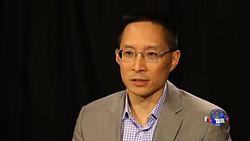Eric Liu Quote
Civic imagination and innovation and creativity are emerging from local ecosystems now and radiating outward, and this great innovation, this great wave of localism that's now arriving, and you see it in how people eat and work and share and buy and move and live their everyday lives, this isn't some precious parochialism, this isn't some retreat into insularity, no. This is emergent. The localism of our time is networked powerfully. And so, for instance, consider the ways that strategies for making cities more bike-friendly have spread so rapidly from Copenhagen to New York to Austin to Boston to Seattle. Think about how experiments in participatory budgeting, where everyday citizens get a chance to allocate and decide upon the allocation of city funds. Those experiments have spread from Porto Alegre, Brazil to here in New York City, to the wards of Chicago. Migrant workers from Rome to Los Angeles and many cities between are now organizing to stage strikes to remind the people who live in their cities what a day without immigrants would look like. In China, all across that country, members of the New Citizens' Movement are beginning to activate and organize to fight official corruption and graft, and they're drawing the ire of officials there, but they're also drawing the attention of anti-corruption activists all around the world. In Seattle, where I'm from, we've become part of a great global array of cities that are now working together bypassing government altogether, national government altogether, in order to try to meet the carbon reduction goals of the Kyoto Protocol. All of these citizens, united, are forming a web, a great archipelago of power that allows us to bypass brokenness and monopolies of control.
Civic imagination and innovation and creativity are emerging from local ecosystems now and radiating outward, and this great innovation, this great wave of localism that's now arriving, and you see it in how people eat and work and share and buy and move and live their everyday lives, this isn't some precious parochialism, this isn't some retreat into insularity, no. This is emergent. The localism of our time is networked powerfully. And so, for instance, consider the ways that strategies for making cities more bike-friendly have spread so rapidly from Copenhagen to New York to Austin to Boston to Seattle. Think about how experiments in participatory budgeting, where everyday citizens get a chance to allocate and decide upon the allocation of city funds. Those experiments have spread from Porto Alegre, Brazil to here in New York City, to the wards of Chicago. Migrant workers from Rome to Los Angeles and many cities between are now organizing to stage strikes to remind the people who live in their cities what a day without immigrants would look like. In China, all across that country, members of the New Citizens' Movement are beginning to activate and organize to fight official corruption and graft, and they're drawing the ire of officials there, but they're also drawing the attention of anti-corruption activists all around the world. In Seattle, where I'm from, we've become part of a great global array of cities that are now working together bypassing government altogether, national government altogether, in order to try to meet the carbon reduction goals of the Kyoto Protocol. All of these citizens, united, are forming a web, a great archipelago of power that allows us to bypass brokenness and monopolies of control.
Related Quotes
About Eric Liu
President Obama nominated him in January 2015 to serve on the board of directors of the federal Corporation for National and Community Service and he was confirmed by the U.S. Senate; his term expired in December 2017.
